The best movies on Amazon Prime Video right now
Small Axe, You Were Never Really Here, and Psycho are among the titles available in Prime Video's library
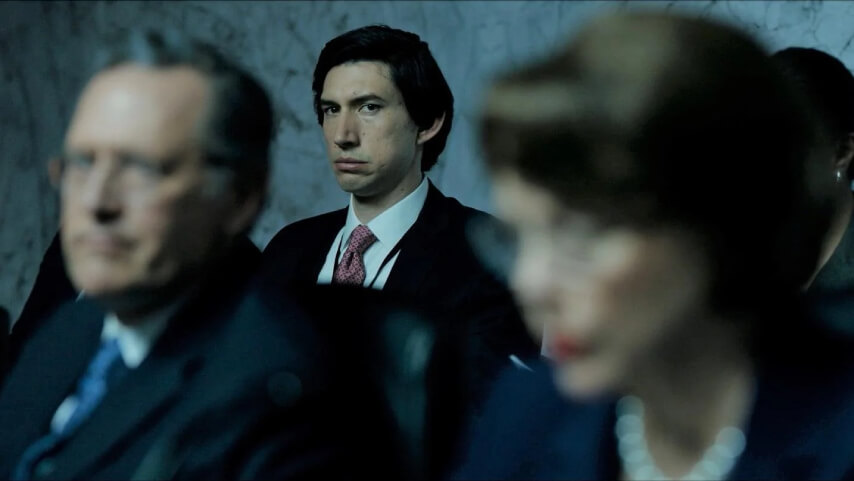
Even if it might be harder to navigate than any of its top-tier streaming peers thanks to its insistence on dividing up its library into channels, Amazon Prime Video still boasts a wide selection of films, including plenty of older movies that services like Netflix simply don’t care to host. That said, its turnover is frequent and subtle. A movie added to a watchlist on Monday might not be there Friday. So, what’s a movie-hungry subscriber to do? Read The A.V. Club’s recommendations for the best movies available on Amazon Prime Video, that’s what.
As far as the company’s original offerings, Oscar nominations abound for films like Manchester By The Sea, Cold War, and The Big Sick. And if you want a solid dose of the classics, you’re in luck: Charade and Rear Window are waiting for you. Check out our roundup of Prime Video’s best viewing options and The A.V. Club’s thoughts on each.
This list was updated on January 1, 2025.
It’s hard to overstate the significance of a film like Anything’s Possible receiving anything akin to a mainstream release. In a time when an unprecedented wave of anti-transgender legislation is sweeping through state legislatures, stories of trans experience are vital and necessary. Though one might hope that empathetic representation might humanize trans folks in the eyes of their oppressors, the value of a story like this one is self-evident to trans teenagers and their allies who otherwise do not see their experiences portrayed on screen, much less in an age of pluralized culture where there’s plenty of room to cater to every audience. This doesn’t give Anything’s Possible a free pass in terms of quality—and there are certainly aspects of Billy Porter’s feature directorial debut that don’t quite work—but screenwriter Ximena Garcia Lecuona crafts such a sweet coming of age tale that it’s easy to celebrate the film’s plentiful merits. [Leigh Monson]
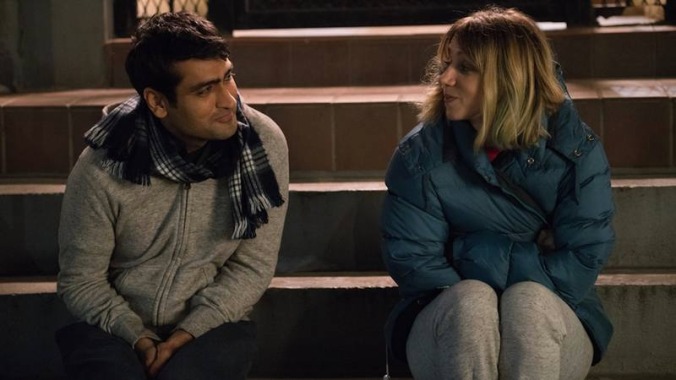
Interesting anecdotes don’t always make for interesting movies; your story may kill at parties, but that doesn’t mean it belongs on the big screen. In The Big Sick, stand-up comedian Kumail Nanjiani, who plays Dinesh on Silicon Valley, and Emily V. Gordon, the writer and former therapist he married, dramatize the rocky first year of their relationship, with Nanjiani starring as a lightly fictionalized version of himself. That may sound, in general synopsis, like a story better told over dinner and drinks; besides friends, family, and fans of the podcast the two co-host, who was clamoring for a feature-length glimpse into the couple’s courtship? But there was more than the usual dating-scene obstacles threatening their future together. Collaborating on the screenplay for The Big Sick, Nanjiani and Gordon have made a perceptive, winning romantic comedy from those obstacles, including the unforeseen emergency that provides the film its title. [A.A. Dowd]
Challengers, seemingly about three tennis players, is actually about three characters who play love like a tennis match, to get ahead and reap the rewards they want. The framework of the film is an important match in the careers of Patrick (Josh O’Connor) and Art (Mike Faist), rivals and former best friends. Between them is Tashi (Zendaya), former girlfriend of one and current wife and coach of the other. In flashbacks, the audience gets to know how they met 13 years ago and how their lives became intricately intertwined. For the tennis matches, Guadagnino has a few tricks up his sleeve. First is Trent Reznor and Atticus Ross’ loud, thumping music. Then, the slowing down of many scenes to an almost standstill to show every nuance of movement on the actors’ faces while ignoring the uninteresting small yellow balls. Sayombhu Mukdeeprom’s camera ogles the actors’ bodies, capturing every flicker of light in their eyes, every trembling lip and sweaty brow. All of this makes for a movie high on sexual heat, something not seen much in contemporary American cinema. [Murtada Elfadl]
Charade is so Hitchcockian that it’s often been confused for the genuine article. Some have called it the best Hitchcock movie that Hitchcock never made. In fact, it was directed by Stanley Donen, famous for movie musicals like Singin’ In The Rain and On The Town. He drafted two tremendous stars from Hollywood’s golden age—Audrey Hepburn and Hitchcock favorite Cary Grant—for his own sleek thriller of the kind the master specialized in. Fun and charming, Charade does have a lot in common with a lighter Hitchcock entertainment like To Catch A Thief: impossibly good-looking leads, glamorous setting, runway-worthy wardrobe (designed by Givenchy), jazzy score (by Henry Mancini). It also uses the Hitchcock trope of the innocent person who finds themselves caught in a weblike conspiracy (which Grant had recently run through in 1959’s North By Northwest). [Gwen Ihnat]
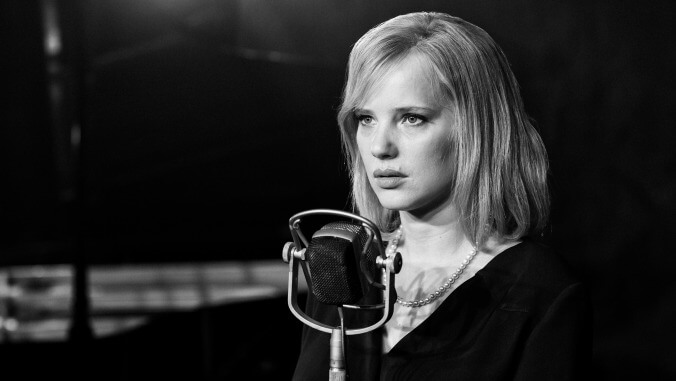
Cold War, from Polish writer-director Pawel Pawlikowski, is a haunted romantic epic in miniature, like a novel written with the careful, precise economy of a short story. Tracking the ups and downs of a tumultuous love affair against seismic shifts in the cultural landscape, it condenses 15 years of plot and history—spread out across four countries situated on the fault line of the 20th century—into a spare, elegant 89 minutes. That kind of ruthless streamlining can make a lesser drama feel like its own CliffsNotes, all who and what and where, no texture or poetry. But Pawlikowski, who doesn’t waste a shot (nor compose one that isn’t a work of art on its lonesome), creates a gripping present tense from the clarity and efficiency of his storytelling: No matter how often he lurches us forward in time, we remain locked into the emotional sphere of his characters. [A.A. Dowd]
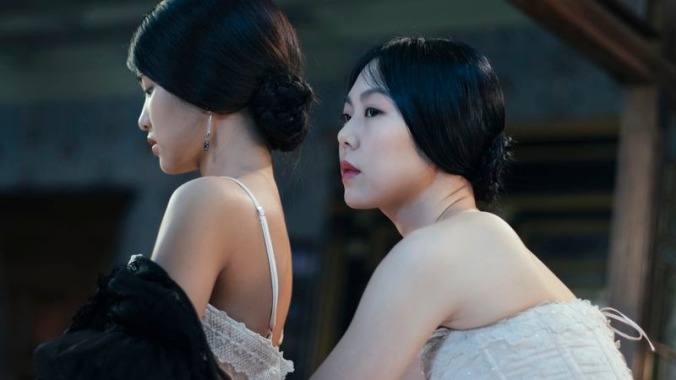
Park Chan-Wook achieves the rank of cinema master with The Handmaiden, which transports Fingersmith, Sarah Waters’ novel of hidden identities and lesbian passion, to 1930s South Korea, adding plenty of Hitchcockian suspense in the process. Sumptuously shot with a fetishistic formality that recalls last year’s The Duke Of Burgundy, Park creates a sensual experience as lush as biting into an overripe peach and as kinky as a pair of leather gloves gently stroking the back of your neck. Kim Tae-ri stars as Sook-hee, a young pickpocket who is hired to work for seemingly sheltered Japanese noblewoman Lady Hideko (Kim Min-hee); the plan is for Sook-hee to help fellow con artist Count Fujiwara (Ha Jung-woo)—who is, in reality, neither a count nor Japanese—defraud Lady Hideko of her fortune. But as their love triangle grows increasingly complicated, it becomes clear that Lady Hideko is not as naive as she seems. Outstanding performances from the female leads carry the film through its dizzying twists and turns, underlaid with a wicked streak of black comedy and an unexpected faith in the power of true love. [Katie Rife]
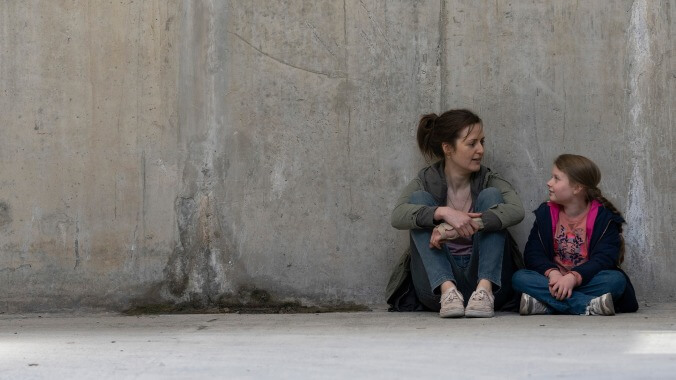
Domestic violence extends, for many, far beyond the physical and into a brutal system not built with the survivor in mind. To leave an abusive household is an uphill battle in many advanced societies, where the courts and laws can put victims at a heavy disadvantage. Directed by Phyllida Lloyd (The Iron Lady), from a script by Malcom Campbell and star Clare Dunne, Herself approaches the subject gracefully, and with an unexpected degree of hope. In an era when neighbors often turn on neighbors, the film’s optimistic “It takes a village” perspective risks hokeyness. But thanks to Dunne’s quietly powerful performance as a single mother barely treading water, the end result is an effective, affecting look at community triumphing over fear. [Anya Stanley]
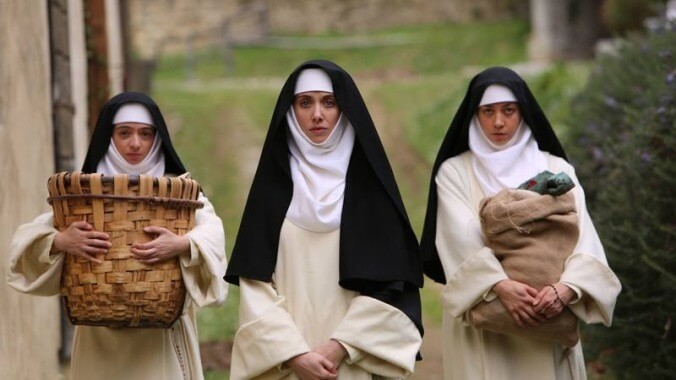
One of the first things Aubrey Plaza says in The Little Hours is “Don’t fucking talk to us.” Anachronism, as it turns out, is the guiding force of this frequently funny, agreeably bawdy farce, which imagines what a convent of the grubby, violent, disease-infested Middle Ages might look and sound like if it were populated by characters straight out of a modern NBC sitcom. Plaza’s Fernanda, a caustic eye-rolling hipster nun born eons too early, sneaks out to get into mischief, using a perpetually escaping donkey as her excuse. Uptight wallflower Genevra (a priceless Kate Micucci) tattles relentlessly on the other women, reporting every transgression to Sister Marea (Molly Shannon, playing her dutiful piousness almost totally straight—she’s the only character here that could actually exist in the 1300s). And Alessandra (Alison Brie), the closest the convent has to a spoiled rich kid, daydreams about being whisked away and married, but that would depend on her father shelling out for a decent dowry. If the plague doesn’t kill them, the boredom will. When Plaza, Micucci, and Brie get smashed on stolen communion wine and perform a drunken sing-along of a wordless choral staple, like college girls sneaking booze past the RA and belting some radio anthem in their dorm, the true resonance of all this anachronism slips into focus: An itchy desire for a better life is something women of every century experience, regardless if their catalog of curses yet includes “fuck.” [A.A. Dowd]
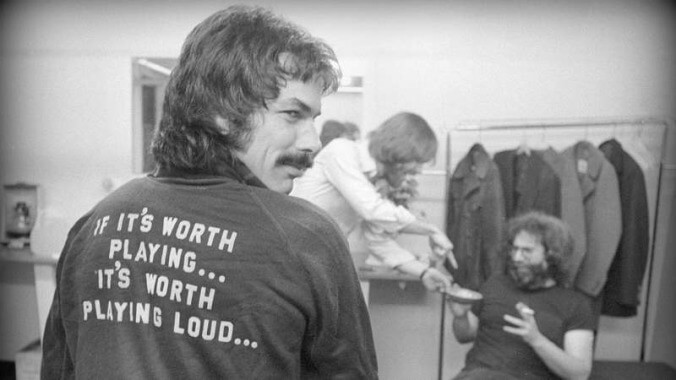
The rare rock documentary that appeals to hardcore fans and also functions as a full, satisfying movie, Amir Bar-Lev’s Long Strange Trip tells the story of the Grateful Dead in an appropriately winding way, taking four hours to riff on different aspects of the band. For those who want to know how and why guitarist Jerry Garcia and his mates emerged from the mid-’60s San Francisco hippie scene to become global cult sensations, that basic info is here. For connoisseurs who want rare live footage and intimate personal anecdotes, Long Strange Trip offers plenty of both. But the main reason why this film will endure is that Bar-Lev (best-known for My Kid Could Paint That, Happy Valley, and The Tillman Story) uses the best and worst moments from Garcia and company’s story to explore how myths are made, and then misinterpreted. [Noel Murray]
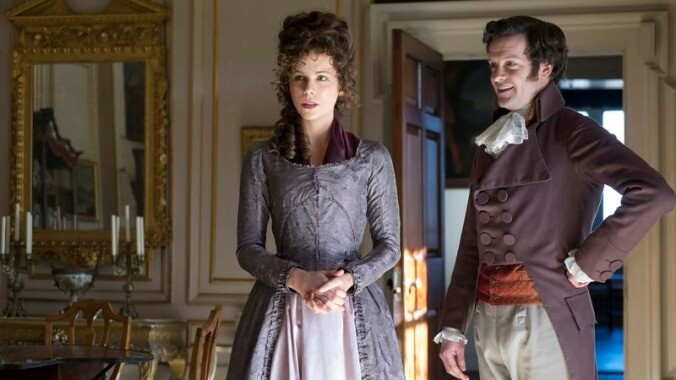
Whit Stillman adapting Jane Austen feels at once apt and almost unnecessary. His previous films—obsessed as they are with manners, social status, and conversational diplomacy—come pretty close to fulfilling any need we might have for a modern-day Austen. Metropolitan’s characters even discuss Austen at length, arguing passionately about Mansfield Park’s virtuous heroine and her relevance to contemporary readers. Some cinephiles may still feel exhausted, too, by the deluge of Austen adaptations that hit TV and multiplexes during the mid-’90s: BBC’s six-part Pride And Prejudice, Ang Lee’s Sense And Sensibility, Roger Michell’s Persuasion, the Gwyneth Paltrow Emma. (These all aired or were theatrically released within a 16-month period, believe it or not.) Still, it’s not as if movies today offer such a surfeit of wit and sophistication that one as purely pleasurable as Stillman’s Love & Friendship can be dismissed. If nothing else, it gives Kate Beckinsale, who previously starred in Stillman’s The Last Days Of Disco, a lead role that isn’t a vampire, and doesn’t require her to battle werewolves while clad in black-rubber fetish gear. [Mike D’Angelo]
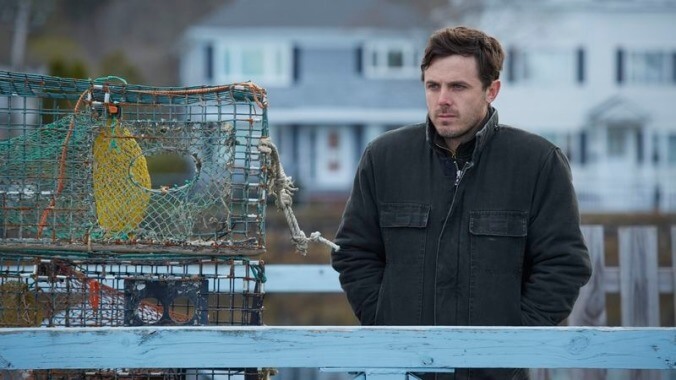
Manchester By The Sea sweats the big stuff and the small stuff, and that’s key to its anomalous power: This is a staggering American drama, almost operatic in the heartbreak it chronicles, that’s also attuned to everyday headaches, like forgetting where the car is parked and hitting your noggin on the freezer door. Director Kenneth Lonergan has had troubles of his own; his last movie, Margaret, suffered a litany of setbacks, disappearing into the editing room for years. Getting another tough, complicated character study off the ground after the well-publicized difficulties of that one is an accomplishment in and of itself. But for his third feature, the playwright-turned-filmmaker hasn’t retreated from Margaret’s messy ambition. Instead he’s managed, somehow, to wed it to the emotional intimacy of his acclaimed debut, You Can Count On Me. The results are almost unspeakably moving—and, at times, disarmingly funny. [A.A. Dowd]
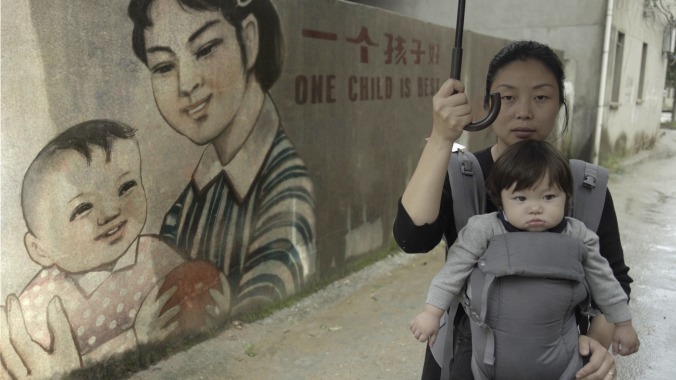
In 1979, China launched its one-child policy, which legally prohibited most parents from having more than a single child. A drastic attempt to curb the nation’s urgent population crisis, it would go on to shape an entire generation. The repercussions of the program—still being felt today, both in China and internationally—are the subject of One Child Nation, which won the U.S. Documentary Grand Jury Prize at Sundance. As wide-ranging in scope as it is horrifying in its particulars, the film does the necessary work of illuminating, for a large audience, a dark chapter of Chinese history. [Lawrence Garcia]
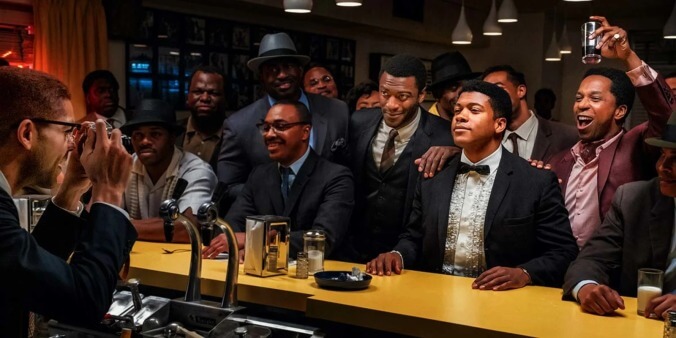
Based on a play by Star Trek: Discovery staff writer Kemp Powers, who adapted the story for the screen, One Night In Miami… mostly takes place in a single location: a segregated Hampton House motor lodge. First-time feature director Regina King adds subtle touches (she’s especially fond of pulling focus) that keep the film from going visually flat, as does the assiduous period detail. But as one might expect from a movie based on a play and directed by a famous actor, dialogue and performances are the driving force. The casting is remarkable: Everyone looks close but not too close to the famous figures they’re playing, which allows the audience to get caught up in the verisimilitude of the story without being distracted by the eeriness of the resemblance. The title card doesn’t appear until 19 minutes in, after each of the four main characters appear in a vignette that lays out the underlying tensions they’ll bring to the extended conversation at the center of the film. (For Brown, it’s the cognitive dissonance of racist whites cheering for him on the football field but only on the football field. For Clay, it’s the stubborn need to prove himself.) As a result of this extended prologue, the cast is huge: Most of the supporting roles, like Lance Reddick as X’s bodyguard, Brother Kareem, and Michael Imperioli as Clay’s trainer, Angelo Dundee, have a relatively small amount of screen time. But there are no weak links in King’s ensemble. [Katie Rife]
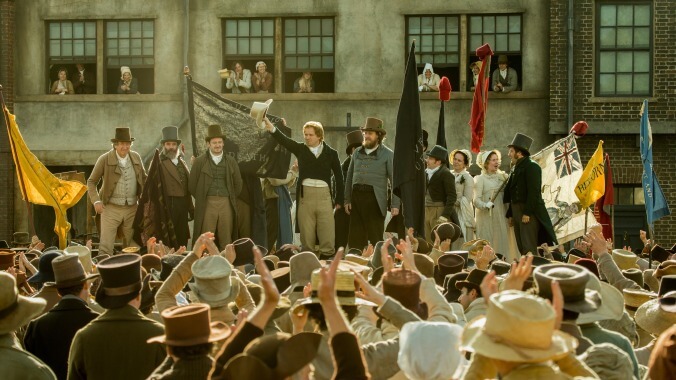
Mike Leigh’s sprawling dramatization of the events leading up to the 1819 Peterloo massacre features a colorful big band of working-class revolutionaries and government cronies. Rather than focus on a single character, Leigh takes a somewhat experimental route, narrowing his attention to the varying textures of speech within the collective to ultimately show how the relationship between rhetoric and action is fraught with misapprehension. The script is a goldmine of delectable language, from the motley Manchester dialect of the peasantry to the ornate, bloviating speech of the aristocracy. It’s politics rendered poetic. [Beatrice Loayza]
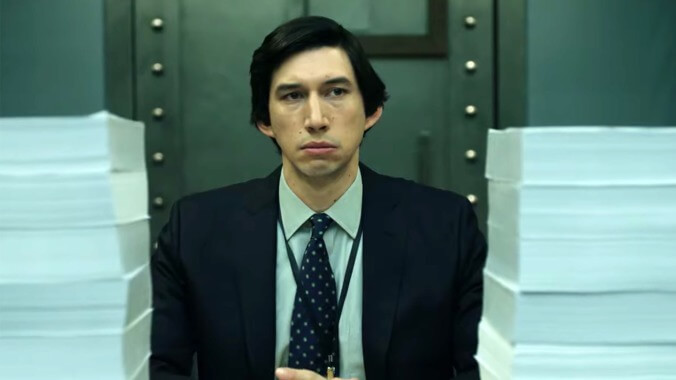
Scott Z. Burns’ look at an Obama-era investigation into the Bush-era CIA torture program captures a sentiment that feels more timely now than ever: the stunned disbelief that somehow even detailed documentation of incompetent, illegal government action isn’t enough to get anyone to do anything about it. Adam Driver may deliver a showier performance in Marriage Story, but the sense of internalized frustration he conveys in The Report is every bit as compelling. [Caroline Siede]
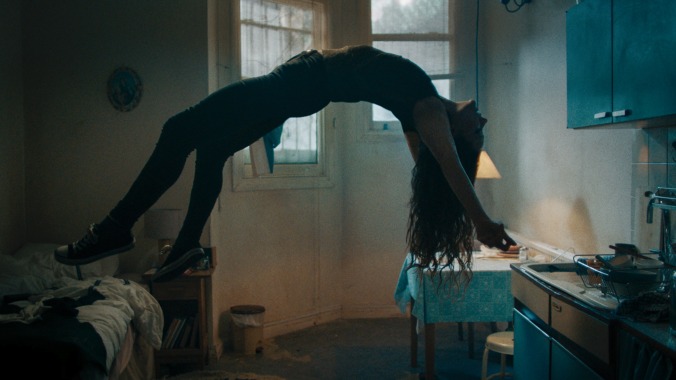
The new converts are usually the most intense. Even those raised in an evangelical environment complete with speaking in tongues and creationist puppet shows (à la the subjects of the infamous Jesus Camp) can’t compete with the flinty fervor of an ex-addict who’s found God. Some even replace old vices with religion, in a kind of one-to-one swap of self-destructive obsession. Such is the case with the title character of writer-director Rose Glass’ first feature. Maud (Morfydd Clark), a home nurse with a troubled past, depends on her regular fix of communion with the divine in order to stay on her newfound righteous path. And when she doesn’t get it? Well, you’ll see. Saint Maud’s combination of talky chamber drama, Paul Schrader-esque character study, and visceral body horror is an ideal fit for A24. In fact, the film contains a scene that’s in direct conversation with an oft-quoted sequence from one of the distributor’s early “elevated” horror triumphs, The Witch. And if there’s no taste of butter for Saint Maud, that’s because her supernatural visitor is the Old Testament type of angel, the kind that inspires both transcendent awe and bone-shaking fear. [Katie Rife]
Along the same lines as her previous picture, Fennell puts her keen eye for visual flourish to brilliant use. Rather than utilizing a widescreen format, she harnesses the claustrophobia of a tight Academy aspect ratio for extra oomph. Yet the spacious outdoors, sprawling castle interiors, and stifled secrets contained within those walls all photograph as tactile and expansive. She places characters in power positions in the frame to connote emotion and capture their psyches. It’s interesting to note where the pair of pals are placed on equal footing in the frame (which happens twice) and where they’re blocked otherwise. Inverted images of Oliver are perhaps the most aesthetically striking. [Courtney Howard]
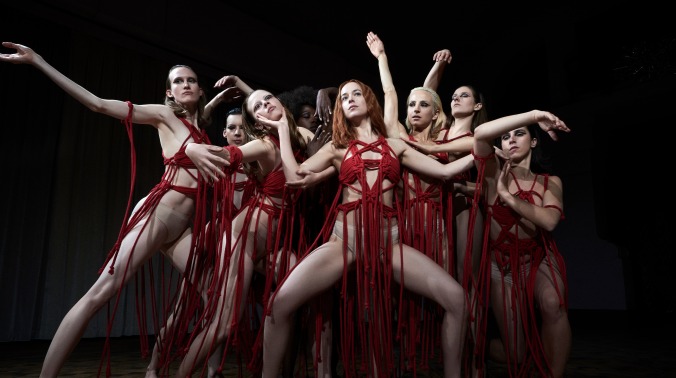
Dario Argento’s horror masterpiece Suspiria (1977) is beautiful to look at, but calling it an art film is a distinctly revisionist impulse. Although the heightened aesthetics and hysterical melodrama of Italian opera have undoubtedly influenced Argento’s style, he also overlays those high-art impulses onto B-movie genre forms. Shot mostly without sync sound and dubbed for both its Italian and American releases, Suspiria wasn’t intended to be a museum piece. In fact, take away the delirious beauty of the color-coded lighting and surging prog-rock score, and you’ve got a simple slasher movie, a film whose “witches at a ballet school” mythology is a mere delivery device for the real attraction: the violent, symbolic violation of young female bodies. Not so with A Bigger Splash and Call Me By Your Name director Luca Guadagnino’s new remake of Suspiria, a film that replaces Argento’s fixation on sexualized violence with arthouse ostentation. In his version, Guadagnino doubles down on the commitment to aesthetics that has given Argento’s original such staying power, but draws from a wholly new set of influences: Soviet-era Eastern Bloc architecture, folk-art collage, ’70s feminist performance art, the films of Rainer Werner Fassbinder. What was bright and colorful is now drizzly and gray, and what was lurid is now self-consciously weighty. [Katie Rife]
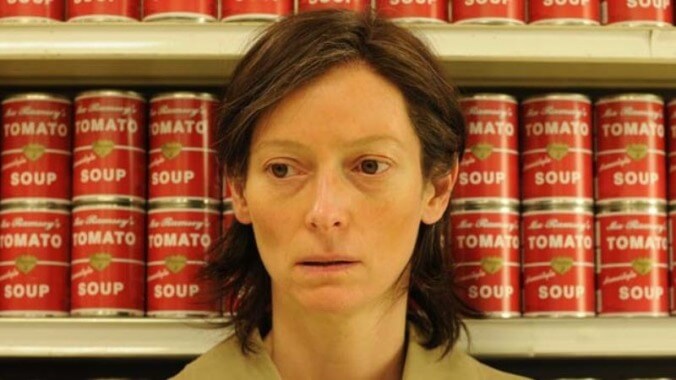
For her radical adaptation of Lionel Shriver’s book, director Lynne Ramsay (Morvern Callar) dispenses with the epistolary format altogether and attempts to access the mother’s troubled psyche without a breath of narration. And in its best sequences, Ramsay puts her duress in dazzlingly visual terms, collapsing the past and present in an associative rush of red-streaked images and piercingly vivid moments out of time. When the film finally settles, it eases into scenes of a zombiefied Swinton, post-massacre, trying to carry on with her son (Ezra Miller) in jail and her neighbors openly expressing their hostility. It also tracks the mother-and-son relationship from the beginning, as an unresponsive infant and toddler grows into a sullen, violent, frighteningly remote teenager—all while his oblivious father (John C. Reilly) looks away. [Scott Tobias]
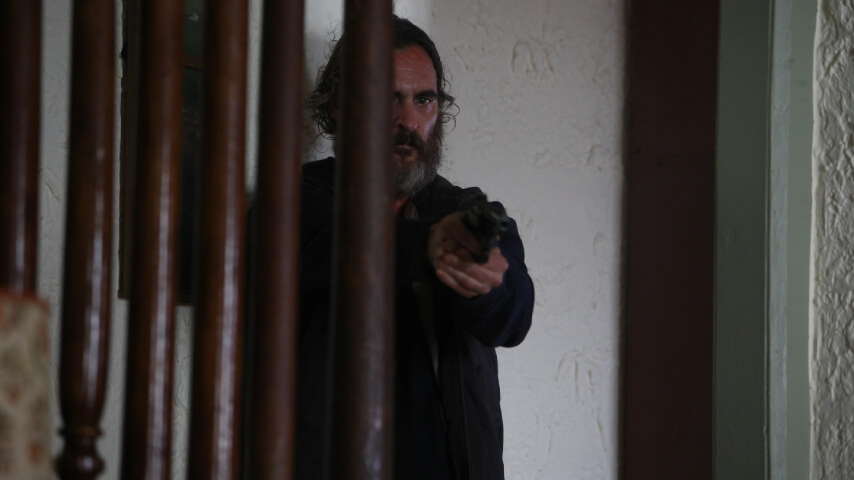
Director Lynne Ramsay’s latest dive into the deepest, most diabolical trenches of the human psyche is as fractured as the consciousness of its protagonist, the physically intimidating, psychologically fragile assassin-for-hire Joe (Joaquin Phoenix). Ramsay swings between understatement and excess with bravado, a destabilizing tactic that injects every loaded silence with a sense of palpable dread. The result is an impressionistic fugue state of a film that illuminates moments of unspeakable violence with the blinding indifference of a flashbulb, a series of Polaroid photographs stashed under a dirty, bloodstained mattress in a blighted Skid Row hotel room. But for all of its grim, broad-shouldered misanthropy, You Were Never Ready Here also finds time for moments of simple, unspoiled beauty—ephemeral, but beautiful nonetheless. [Katie Rife]
GET A.V.CLUB RIGHT IN YOUR INBOX
Pop culture obsessives writing for the pop culture obsessed.